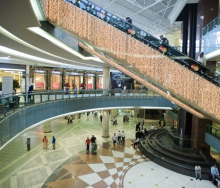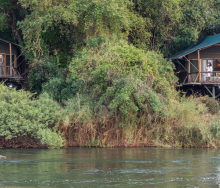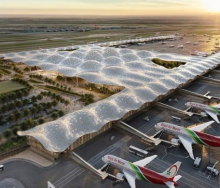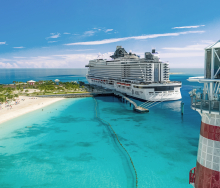Tourisim is needed more than ever
THE negative publicity
surrounding the Cape
Town water crisis, brought
on by one of the worst droughts
in years, threatens to damage
the city’s tourism at a time
when tourism support is all the
more important.
Authorities are working
hard to present a realistic
image of the situation, and
while continuing to convey
its seriousness and urge a
responsible approach to water
saving, are intent on refuting
perceptions of bone-dry taps.
Travel Counsellor Tanya
Edwards, based in Cape Town,
feels a level of absurdity has
tainted the crisis. She told
TNW: “I think it’s so important
to let the public know what
really is going on in hotels.
A friend of mine from the UK
inboxed me the other night
asking if we were okay and
if I had water – apparently
somebody posted a photo of
herself under a showerhead of
a posh Cape Town hotel saying
that the hotel had no water.
That’s really bad because
apparently this person has lots
of followers because she has a
public profile.”
The Western Cape
Government, the City of
Cape Town and tourism
bodies, including Cape Town
Tourism, the Southern African
Association for the Conference
Industry (Saaci), the Federated
Hospitality Association of
South Africa (Fedhasa), Cape
Town and Western Cape
Tourism, Trade & Investment
(Wesgro) and the Southern
Africa Tourism Services
Association (Satsa) recently
issued a joint statement
emphasising that Cape Town
and the Western Cape are
“open for business”.
They have pointed out that
there is adequate water for
tourists’ essential daily needs
such as washing, drinking and
daily hygiene. Further, water
restrictions are isolated to
parts of the Western Cape,
particularly Cape Town and
surrounding areas, but nearby
regions like the Cape Overberg
and the Garden Route are less
impacted.
Water-saving measures are
currently yielding results, and
at the time of writing, Day
Zero – the projected day when
the city will cut the regular
flow of water (not the day the
city runs out of water) – had
been pushed back from March
2018 to some time in 2019,
dependent on the winter rains.
City Lodge ce, Clifford Ross,
has observed a dip in business
in the Cape Peninsula, where
the group has six hotels. “STR
Global stats are showing a
decline in occupancy over the
past few months, but whether
it is directly associated with
the drought is not known,” he
said. Consumer confidence
and lack of disposable income
have also come into play.
Fedhasa Cape chairperson,
Jeff Rosenberg, confirmed the
drop: “Regrettably, a few of our
member establishments have
recorded a decline in bookings,
largely due to negative media
reports on the water crisis,
which has created a sense of
panic.”
The association conducted
an occupancy survey in
January, and feedback from
55 member establishments
surveyed indicated that:
close on 50% of members
said the 2016 holiday
season outperformed 2017.
about 39% said they were on
par with 2016 figures.
only 16% said the 2017
holiday season surpassed
that of 2016.
Clifford said it was too early
to tell if appeals for continued
tourism support from industry
associations were having a
positive effect. “It is the busy
season in Cape Town with lots
of events happening. As long
as these continue, the tourists
should still consider this region
for travel.”
Jeff, however, believes
that the cohesive ‘open
for business’ messaging
is working. “We have seen
a reduction in queries and
cancellations compared with
the December-January period.
Many bookings from our
traditional markets in Europe,
the US and China continue to
filter through,” he said.
Members, he noted
were reporting that guests
at the various hotels,
small accommodation
establishments and
restaurants were very
understanding of and
supported the initiatives that
had been put in place.
Benefits outweigh negatives
Wesgro has emphasised
that the city needs tourism
support at this time and has
offered these points in favour
of continued tourism:
Visitors inflate the local
population by small
amounts. During high
season, domestic visitors
add 2,86% to the City of
Cape Town’s population
and 1,12% is added by
international visitors.
Tourists only spend a few
days in Cape Town, and
then travel to other parts
of the province or country.
Tourism contributed R38bn
to the Cape economy in
2017, which proves
that the impact of tourism on water
consumption is outweighed by its
benefit to the economy.
Despite the small addition to the
population size, tourism supports
206 000 direct jobs, 55 763
indirect jobs and 56 243 induced
jobs – a total of over 300 000 jobs
across the Western Cape.
The drought has had a devastating
impact on the agricultural sector
since last year and thousands
of jobs have already been lost in
that sector. Tourism can assist in
shouldering this impact, especially
in the smaller towns.
The tourism industry has led the
way in reducing the consumption
of water by tourists, ensuring that
each tourist ‘saves like a local’.
Tsogo Sun, the largest hotel
group in the Cape, has cut its
consumption of water by 40%.
Good news for the city, and South
African tourism in general, is that
current political changes have the
potential to counteract the negativity
of the drought. “The mood in the
country is more positive than it
has been in years and could result
in better business and consumer
confidence for the year ahead,”
says Clifford.
Too late?
RETAIL consortium bosses quizzed
by TNW last month had a dim view of
Cape Town’s prospects as the drought
drags on. Marco Ciocchetti, ceo of XL
Travel, said his outlook for the city’s
tourism this year was “bleak”. “I don’t
believe the tourism industry has been
consulted. There is and was no need
to alarm tourists... Firstly, because they
are not inconvenienced at hotels and,
secondly, because by alarming them
they just won’t come.”
Club Travel md, Wally Gaynor, said
the damage was done once the
situation hit international headlines
and was compounded by a US travel
warning to visitors. “They are nervous
and will think twice about travelling
here in the next few months.”
Marco said there had been some
domestic leisure drop-off, corroborated
by hotels and airlines, but international
inbound travel was mainly affected.
Club Travel has not had cancellations
on its domestic corporate side, but a
large international conference, set for
May, has been cancelled.
Wally, however, said: “I feel we are at
the end of the major tourist season,
bar the Easter period.” The Western
Cape government recently announced
that Day Zero would no longer happen
this year but the drought has now been
declared a national disaster.
Hospitality sector pulls out the stops
MANY hotels in Cape Town fall into
business protection zones (BPZs)
to which the City of Cape Town will
continue to supply water. These are
zones with the highest number of
jobs.
Most have put measures in place
to reduce water usage. Mandated
guidelines suggest a shower of
no longer than two minutes, and
the removal of bath plugs has
discouraged bathing. Guests are
encouraged to flush toilets less
often, use their towels for longer
periods and utilise supplied
waterless hand sanitisers.
Basin taps have been fitted with
sensors and aerators to reduce flow,
swimming pools are closed or kept
open part time, and some hotels
have converted their swimming pools
to salt water and are being proactive
in developing their own desalination
plants. Gardens are kept going with
grey water.
Linen tableware, which requires
laundering, has given way to
disposable varieties and City Lodge
is considering the outsourcing of
laundry to off-grid service providers,
or the establishment of a central
facility to handle all its laundry
requirements.
Some of the more innovative
initiatives to assist conservation,
says Fedhasa’s Jeff Rosenberg,
are the installation of low-flow
technology, reverse osmosis plants,
pool water harvesting systems and
water-from-air machines.
Did you know?
Water-short Nelson Mandela Bay has also issued an ‘open for business’ message, while
encouraging visitors to help save water. According to mayoral committee member for
Economic Development, Tourism and Agriculture, Andrew Whitfield, levels of supply
dams have reached an all-time low of 24%. The municipality has embarked on a
groundwater exploration programme.















